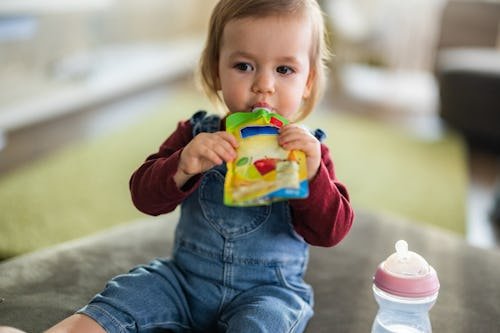
I stand in solidarity with every parent going through a picky eating stage: It’s a f*cking minefield. One minute, peppers are all the rage and I’m buying them in bulk. The next, peppers are absolutely disgusting, and it’s unfathomable that I’d even think about serving them. Pediatric gaslighting — it’s a thing.
So, to make sure my 4-year-old gets her produce (and to help me sleep at night), we supplement with a lot of fruit and vegetable pouches. Choosing them at the store is like picking out the most sophisticated astronaut food: Do you want a blend of apples, beets, and chia seeds? Perhaps carrot, banana, and amaranth? And why have just regular carrots when yellow ones are an option, too?
But of course, mom guilt never takes a day off, so I started wondering what damage I was doing to my daughter’s teeth, appetite, and soul by giving her pouches. To find out, I tapped Jennifer House, a pediatric nutritionist and the founder of First Step Nutrition in Calgary, Canada (hello northern neighbor!). House is the real deal — she has a master’s of science in nutrition and is a registered dietitian, so she knows the science and isn’t afraid to use it. And most importantly, she’s a mom who gets the appeal.
"They’re easy, shelf-stable, and not messy," she says. "Some pouches have a decent amount of vitamins A and C. I’d definitely prefer them over a chocolate chip granola bar."
Alas, there’s always a but, and hers is this: The nutrition profile just isn’t as good as the real thing. Pouches tend to be lower in fiber, and most lack protein or fat — essential nutrients to help your little one grow (not to mention stay full). And the sugar content can be sneaky, as some have added sugars or fruit juice concentrate.
One thing not to stress about, though? After last year’s recall of some baby food pouches for lead and other heavy metals(!), parents are naturally concerned about what’s in their kids’ pouches. It’s totally fine to reach for organic ones, House says, but the research that they’re better for your kiddos isn’t totally there.
"The problem with contamination is you would never know," she says. "It depends on factors like where the ingredient comes from and what the soil condition is."
Instead, House recommends going by the nutrition labels, picking pouches with simple ingredients you recognize and no added sugar. The ingredient list goes in descending order, so the first item is the one that makes up the most of the pouch. That’s something to keep in mind. If you’re looking at a pouch that claims it’s loaded with veggies, it may only be a small amount.
But first, breathe a sigh of relief: Kids often need less food to meet their nutritional requirements than parents think — and there are more ways than one to do so.
"Parents always talk about vegetables, but fruits contain the same nutrients," she says. "Fiber is also important, but you can get it from whole grains or beans. And a multivitamin takes some of the pressure off, too."
It’s tempting to hide vegetables in homemade food so your kids will eat them (I’m extremely guilty of adding diced broccoli to my meatballs), but this could actually cause kids to distrust what’s in front of them. Instead, House recommends you keep offering different veggies without pressure, and don’t be afraid to use dips, sauces, and butter. (Finally, a nutritionist who recommends butter!)
The most important thing, though, is to not beat yourself up for whipping out pouches when you need to.
"With practice and encouragement from you, one day, your child will likely decide to eat vegetables," House says. "In the meantime, you can continue to offer pouches without guilt."
Disclaimer: This story has not been edited by us and is published as shown on Scary Mommy.


Leave a Reply